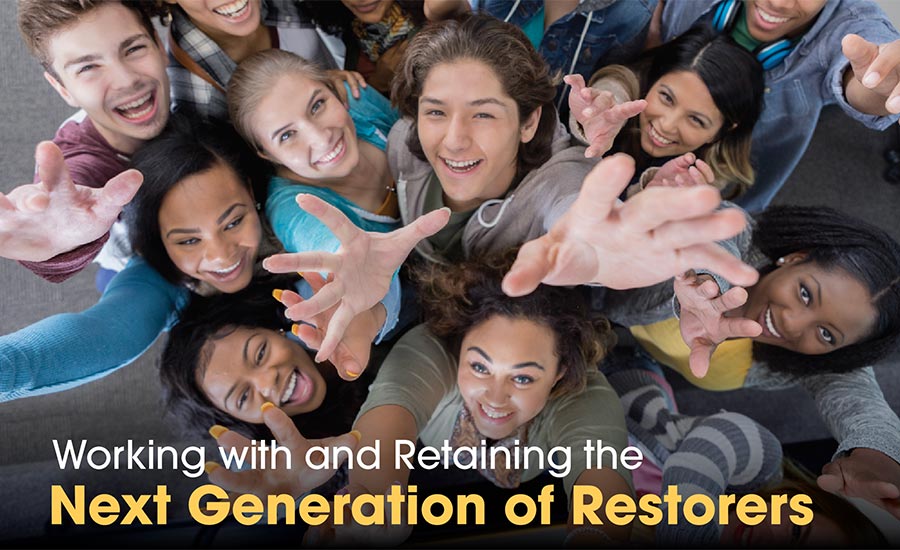I enjoy reading entry level job advertisements for the restoration industry. They remind me of a simpler way of living. Pack a lunch every night, wake up earlier than you want to, perform physical labor before 7 a.m., break for 15 minutes at lunch, and come home tired. The rhythm of these days is calming. It reminds me of where I am now, how my perspective has changed, and encourages me to simplify work. However, most current job advertisements are written for a prior generation. The desires of the next generation are fundamentally different.
When researching this group of workers, you will find many articles about college-educated people entering the workforce. This is content for big business and shops with 30+ employees, but what about the rest of the market? What about the world of small business? How can small businesses adapt to the changing landscape of appealing to and attracting younger workers?
With unemployment at historically low levels and the competition for entry level workers at an all-time high, you can improve your chances of attracting, training, and retaining the next generation of entry level technicians and office staff by keeping four points in mind.
While your operation doesn’t need to perform these functions flawlessly, you must be aware of and work toward understanding what these items mean to workers.
1. Develop Emotional Quotient (EQ), Emotional Intelligence (EI), and Empathy
This is an important difference maker in your operation; one that matters to the youngest generation of workers. But what is it? In a basic form, it’s knowing what you think about a situation or policy, finding out what employees think about it, and making decisions with the information you gather in mind. In The Millennial Whisperer, author Chris Tuff states, “Kindness and compassion matter…not just in the workplace, but in everyday life.” This practice may sound simple, but it often requires a change in how we approach those around us.
This shift in mindset is increasingly evident. In the past, technicians would stay at work and perform tasks because that was their paycheck and how they took care of their family. You asked them to do something and they did. The next generation is increasingly self-aware, and it is imperative that we ask ourselves and those in our care, “Why?” Why are you committed to waking up at 2 a.m. to remove sewage from a basement? Why do you think it’s important to crawl into an attic to identify problems with ventilation? Why do you work with this company? If done with kindness and compassion, it’s likely that you will learn from those around you and appreciate their work efforts more.
2. Realize that Compensation is Not a Secret
You’ve completed two or three rounds of interviews, identified the best candidate, and begun to discuss compensation. The next generation applicant has done their homework. Pay rates for the restoration industry are available on several websites, so they can quote a number that is at or above what your most skilled technician or office personnel are paid. They are not brash or disrespectful; they have simply learned that they may get what they ask for.
Be prepared for this conversation. The person sitting across from you wants the highest pay possible, but it normally isn’t the primary driver behind their job search. To take another cue from author Chris Tuff, he believes that Millennials are looking for personal growth and development. He has stated that it is crucial for business leaders to get the ‘deal’ right when attracting top Millennial talent, because they want to be part of an organization that lets them move forward in a professional and personal capacity. In your discussion, be honest about where the compensation for an entry level person starts and that what they’re asking for is not possible right now. But be sure you have a plan to develop entry level techs or office personnel all the way through to management. If you stick to the plan, you will receive their best efforts. These candidates are not afraid to work hard to get what they want, but they need guidance and purpose.
3. Accommodate their Communication Style
The next generation workforce has been trained by the internet. They understand that the best information may come from a guy in a black t-shirt and jeans, a selfie video, or be crowd-sourced. This group does not rely on a perfect, polished presentation to recognize valuable content.
Give them a path to casual interactions with those delivering the message. Email is too formal for this group, a phone call is ineffective and awkward, and the intent of your communication is often misunderstood. Realizing this is an advantage, as there are many free or nearly free applications that give you the ability to communicate with this group in their language. Critical conversations should still be conducted face to face or through email, but average, everyday check-ins or questions should be adapted to their preferences. Consider a deviation from your current communication practices and you just might receive a thumbs up emoji!

4. Work to Retain the Next Generation of Restorers
Retention of the next generation requires hard work from your management staff. There are many books about how to communicate more effectively, the pattern of communication, the frequency of employee reviews and training, and on, and on. But as an industry, we often fail to apply these lessons and provide little to no feedback to those in our care. It is our duty to retain the next generation of restorers by doing the work suggested in the wisdom we have collected. Doing so will help you to avoid losing frontline staff as many restorers have.
You’ve heard the story: a new, well-paid water technician quits after being onsite for a half day. The technician doesn’t leave after the cuts and bruises, cleaning up category 3 water, or hauling dehumidifiers up the stairs. They leave because of a lack of communication. At some point during the day the new technician is told they must work after hours. They resist, and the lead doesn’t bother to ask why they are unwilling to work. In a two-minute conversation, several potential years of production are lost without first gathering relevant information.
Companies often do not effectively communicate the requirements of the job up front, nor do they reinforce the requirements and ensure understanding. During exit interviews, workers have stated that given an opportunity to consider and understand a company’s culture and after-hours policy, they would have continued employment. Increase understanding between owners and frontline staff by communicating clearly, communicating often, and understanding EQ.
Is your company ready to do the work necessary to retain the next generation of restorers?
The advertisements I read are correct—the restoration business does require hard work and will continue to. The next generation of workers will give you their best, but they expect the best from you. Be in tune with what they want, pay market rates, train them well, and communicate in their preferred style. If you prepare and deliver on these promises, you will win the next generation of employees who care about your company’s future.

